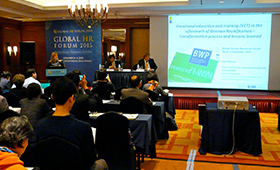Korea focusses attention on dual vocational educational training
South Korea is showing a keen interest in the German experience to support the reform of the (vocational) education and training system in the country. The various invitations to South Korea received by the BIBB over recent times are clear evidence of this.

The HR forum offers a prestigious platform at which academia, politics and practice come together annually. The BIBB was invited to participate and deliver a presentation in the session covering “Vocational education and training in a unified Korea”. Ms Thomann, department head at the BIBB, spoke about the transformation process following German reunification, and those attending listened with interest as she reported on relevant experiences with vocational education and training in Germany. Further information regarding the HR forum is available at http://www.ghrforum.org/eng.
Dual vocational education and training on the German pattern

South Korea wants to test selected structures of the German system of vocational education and training. The German VET system was introduced by German VET stakeholders at the annual conference of the Human Resources Development Service of Korea (HRD Korea) in September 2015.
By reforming its VET system South Korea is planning to achieve an increased labour market orientation. A key factor in this context is to involve the enterprises in vocational education and training. An event at the annual conference of the Human Resources Development Service of Korea (HRD Korea) in September 2015 in Seoul addressed the further reform of vocational education and training in South Korea.
Germany was the only country that was invited to introduce its VET system. The Federal Institute for Vocational Education and Training (BIBB) presented the concepts and prerequisites of the German dual system of vocational education and training in a talk with the topic of "German Hidden Champions – Concept, Preconditions (VET) and Strategies". A talk on the possibilities of transfer into other countries was presented by the German Agency for International Cooperation (GIZ).
The subsequent discussion of the predominantly Korean audience focused on in-company training, training quality, demands on the training staff and the technological infrastructure.
Representatives from Latin America (e.g. from Panama, Ecuador, Chile and Brazil) were among the audience as well. They informed the BIBB and the GIZ about the urgent need to modernise their vocational education and training systems.
The conference had about 4,000 participants, among them the President of HRD Korea, Young-bum Park, a representative of the Korean Ministry of Employment and Labor (MoEL) and various other representatives of MoEL, KRIVET, HRD Korea and a range of initial and continuing education and training providers.
The situation in South Korea is characterised by high youth unemployment rates, a shortage of qualified specialists and a low social prestige of vocational education and training. Against that background, the Human Resources Development Service of Korea (HRD Korea), a branch of the MoEL, concerns itself with deliberations on reforming vocational education and training in South Korea.
South Korea is using the German dual system of vocational education and training as a guideline in reforming its VET system. In certain sectors, for example the Master High Schools, attempts are made to establish a duality in accordance with the country-specific context.
The internationally operating Korean "global players" (such as Samsung, Hyundai, Kia) notwithstanding, crafts and medium-sized businesses are considered as the economic backbone of South Korea. The enterprises are facing comparable challenges, for example with regard to the acquisition of skilled workers. To these companies, quality of training constitutes a crucial competitiveness factor in the recruitment of junior staff, where they compete with the industry and its highly attractive training opportunities and environments. Apart from training quality, other core elements of a modern and adaptable VET system in South Korea are the transition from initial education and training to qualified employment and the standards of trainer qualification.